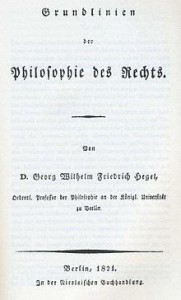 Philosophy of Right by G.W.F. Hegel also known as Elements of the Philosophy of Right starts out with a discussion of the concept of free will and argues that free will can only realize itself in a complex social context of property rights and relations, contracts, moral commitments, family life, the economy, the legal system, and the political system. A person is not truly free, in other words, unless he is a participant in all of these different aspects of the life of the state. For instance, Hegel writes:
Philosophy of Right by G.W.F. Hegel also known as Elements of the Philosophy of Right starts out with a discussion of the concept of free will and argues that free will can only realize itself in a complex social context of property rights and relations, contracts, moral commitments, family life, the economy, the legal system, and the political system. A person is not truly free, in other words, unless he is a participant in all of these different aspects of the life of the state. For instance, Hegel writes:
The state’s consciousness and the most conspicuous education are found in the middle class, to which the state officials belong. The members of this class, therefore, form the pillars of the state in regard to rectitude and intelligence. The state, if it has no middle class, is still at a low stage of development. In Russia, for example, there is a multitude of serfs and a host of rulers. It is of great concern to the state that a middle class should be formed, but this can be effected only in an organization such as we have described, namely, by the legalization of particular circles, which are relatively independent, and by a force of officials, whose wilfulness has no power over these legalized circles. Action in accordance with universal right, and the habit of such action, are consequences of the opposition produced by these self-reliant independent circles.
Download the full pdf-book here (793 Kb/281 pages):
 Hegel Philosophy of Right
Hegel Philosophy of Right
Watch a quick introduction to Hegels Philosophy of Right here:
What are the most important aspects of Hegel’s philosophy?
Georg Wilhelm Friedrich Hegel is a German philosopher who developed a comprehensive philosophical system that encompasses logic, nature, history, art, religion, and politics. Some of the most important aspects of his philosophy include:
- Dialectic: Hegel’s dialectical method is a central aspect of his philosophy. He believed that truth is revealed through the process of thesis-antithesis-synthesis, where a thesis is challenged by its opposite, leading to a synthesis of the two. This process is known as the dialectic and is used by Hegel to understand the development of history, culture, and the human mind.
- Absolute Spirit: Hegel’s concept of Absolute Spirit is a central aspect of his philosophy. He believed that the universe is a rational and self-developing system, and that the human mind is a reflection of this absolute Spirit. He also believed that history is the story of the absolute Spirit’s self-realization.
- State: He believed that the state is the highest expression of the rational will, and that it should be the embodiment of moral and ethical principles. He argued that the state should provide for the needs of its citizens and that it should be guided by the principles of freedom, equality, and justice.
- Philosophy of history: He believed that history is a rational and purposeful process, and that it is moving towards a final goal of the realization of freedom. He believed that the state is the highest expression of the rational will, and that it should be the embodiment of moral and ethical principles.
- Aesthetics: He believed that art was an important means of expressing the absolute Spirit, and that it played a role in the development of human consciousness. He wrote extensively on the nature of beauty and the role of art in the development of human culture.
These are some of the most important aspects of Hegel’s philosophy, but his work is quite vast and it is important to study it in depth to fully understand it.

